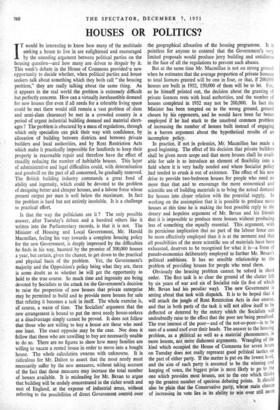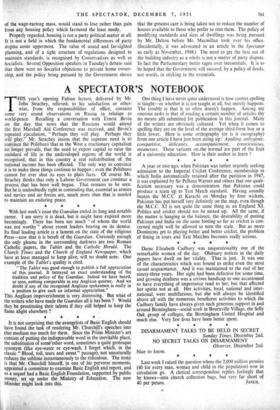HOUSES OR POLITICS?
IT would be interesting to know how many of the multitude seeking a house to live in are enlightened and encouraged by the unending argument between political parties on the housing question—and how many are driven to despair by it. This week's debate in the House of Commons provided-a new opportunity to decide whether, when political parties and house seekers talk about something which they both call "the housing problem," they are really talking about the same thing. As it appears in the real world the problem is extremely difficult but perfectly concrete. How can a virtually inexhaustible demand for new houses (for even if all needs for a tolerable living space could be met there would still remain a vast problem of slum and semi-slum clearance) be met in a crowded country in a period of urgent industrial building demand and material short- ages ? The problem is obscured by a mass of regulations, through which only specialists can pick their way with confidence, by allocation of building between districts and between private builders and local authorities, and by Rent Restriction Acts which make it practically impossible for landlords to keep their property in reasonable repair and therefore have the effect of steadily reducing the number of habitable houses. This layer of administrative and legal difficulties could, with determination and goodwill on the part of all concerned, be gradually removed. The British building industry commands a great fund of ability and ingenuity, which could be devoted to the problem of designing better and cheaper houses, and a labour force whose present output per man is well below the maximum. In fact the problem is hard but not entirely insoluble. It is a challenge to practical effort.
Is that the way the politicians see it ? The only possible answer, after Tuesday's debate and a hundred others like it written into the Parliamentary records, is that it is not. The Minister, of Housing and Local Government, Mr. Harold Macmillan, feeling his way towards a complete housing policy for the new Government, is deeply impressed by the difficulties he finds in his way, haunted by the promise of 300,000 houses a year, but certain, given the chance, to get down to the practical and physical basis of the problem. Yet, the Government's majority and the Opposition's policy being what they are, there is some doubt as to whether he will get the opportunity to hold to the true course. So much time and ingenuity are being devoted by Socialists to the attack on the Government's decision to raise the proportion of new houses that private enterprise may be permitted to build and to provide more houses for sale that refuting it becomes a task in itself. The whole exercise is, of course, a waste of time. The Socialists' argument that the new arrangement is bound to put the most needy house-seekers at a disadvantage simply 'cannot be proved. It does not follow that those who are willing to buy a house are those who need one least The exact opposite may be the case. Nor does it follow that those who are unwilling to buy are necessarily unable to do so. There are no figures to show how many families are willing to vacate a rented house in order to move into a bought house. The whole calculation swarms with unknowns. It is ridiculous for Mr. Dalton to assert that the most needy must necessarily suffer by the new measures, without taking account of the fact that those measures may increase the total number of houses available. It is misleading for Mr. Bevan to argue that building will be unduly concentrated in the richer south and east of England, at the expense of industrial areas, without referring to the possibilities of direct Government control over the geographical allocation of the housing programme. It is pointless for anyone to contend that the Government's very limited proposals would produce jerry building and untidiness in the face of all the regulations to prevent such abuses.
But at the same time Mr. Macmillan is not on strong ground when he estimates that the average proportion of private licences to total licences granted will be one in four, or that, if 200,000 houses are built in 1952, 150,000 of them will be to let. For, as he himself pointed out, the decision about the granting of private licences rests with local authorities, and the number of houses completed in 1952 may not be 200,000. In fact the Minister has been tempted on to the wrong ground, ground chosen by his opponents, and he would have been far better employed if he had stuck to the unsolved common problem of increasing the number of houses built instead of engaging in a barren argument about the hypothetical results of an incomplete policy.
In practice, if not in polemics, Mr. Macmillan has made a good beginning. The effect of his decision that private builders shall be given more scope and that more houses shall be avail- able for sale is to introduce an element of flexibility into a field where it is very badly needed and where Socialist policy .had tended to crush it out of existence. The effect of his new drive to provide two-bedroom houses for people who need no more than that and to encourage the more economical and scientific use of building materials is to bring the actual demand for houses into closer relation with the potential supply. In working on the assumption that it is possible to produce more houses at this time he is making the best possible reply to the dreary and hopeless argument of Mr. Bevan and his friends that it is impossible to produce more houses without producing less of something else equally essential. This argument, with its pernicious implication that no part of the labour force can be more effectively employed than it is at the moment and that all possibilities of the more scientific use of materials have been exhausted, deserves to be recognised for what it is—a form of pseudo-economics deliberately employed to further Mr. Bevan's political ambitions. It has no sensible relationship to the problem of providing houses for people who need them.
Obviously the housing problem cannot be solved in short order. The first task is to clear the ground of the clutter left by six years of war and six of Socialist rule (in five of which Mr. Bevan had his peculiar way). The new Government is setting about that task with dispatch. It is to be hoped that it will attack the jungle of Rent Restriction Acts in due course, and that in both parts of the task it will not allow itself to be deflected or deterred by the outcry which the Socialists will undoubtedly raise to the effect that the poor are being penalised. The true interest of the poor—and of the not-so-poor—is to be sure of a sound roof over their heads. The answer to the housIng problem, as a pblitical as well as a material phenomenon, is more houses, not more dishonest arguments. Wrangling of the kind which occupied the House of Commons for seven hours on Tuesday does not really represent good political tactics on the part of either party. If the matter is put on the lowest level, and the aim of each party is assumed to be the winning and keeping of votes, the biggest prize is most likely to go to the one which provides most houses, not to the one which thinks up the greatest number of specious debating points. It should also be plain that the Conservative party, whose main chance of increasing its vote lies in its ability to win over still more of the wage-earning mass, would stand to lose rather than gain from any housing policy which favoured the least needy.
Properly regarded, housing is not a party political matter at all. It is not a field in which the fundamental differences of party dogma come uppermost. The value of sound and far-sighted planning, and of a tight structure of regulations designed to maintain standards, is recognised by Conservatives as well as Socialists. Several Opposition speakers in Tuesday's debate said that there were no Socialist objections to private home owner- ship, and the policy being pursued by the Government shows that the greatest care is being taken not to reduce the number of houses available to those who prefer to rent them. The policy of modifying standards and sizes of dwellings was being pursued by Mr. Dalton before Mr. Macmillan took over his office. (Incidentally, it was advocated in an article in the Spectator as early as November, 1948.) The need to get the best out Of the building industry as a whole is not a matter of party dispute. In fact the Parliamentary battle rages over inessentials. It is to be hoped that the Government will succeed, by a policy of deeds, not words, in sticking to the essentials.



















































 Previous page
Previous page